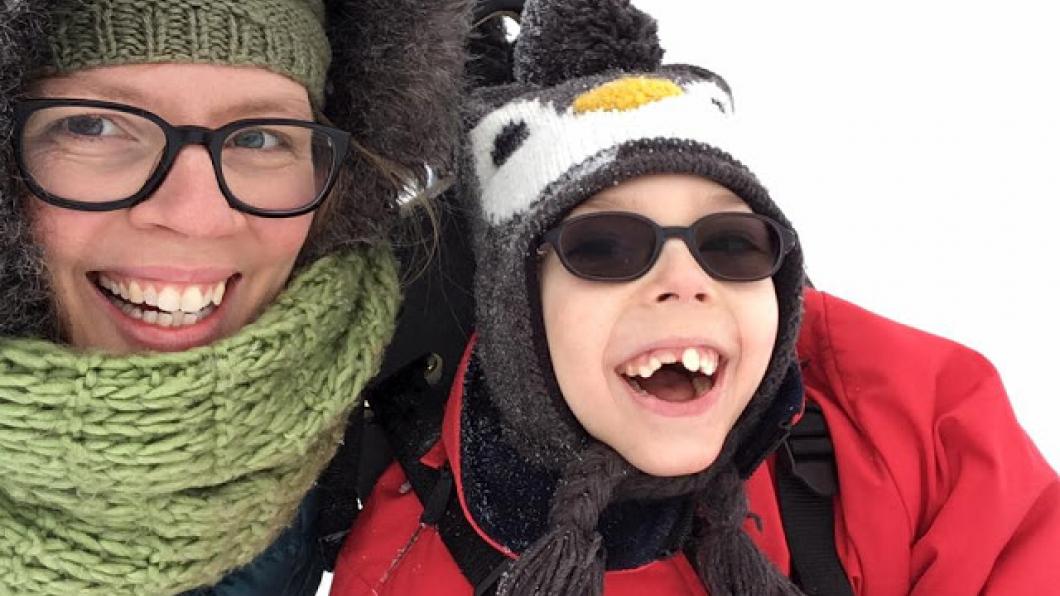
Family's residency in limbo over son's cerebral palsy
By Louise Kinross
Six years ago Kara Melissa Sharp’s family moved to Canada on a work visa her husband Alastair held as a journalist. They brought their son Sebastian, now 8, who has cerebral palsy. Since then daughter Tallula, 4, was born and is a Canadian citizen.
Three years ago the family applied for permanent residency. In November 2015 the government asked for additional information about Sebastian’s education and health. A year later the government wrote to say Sebastian’s health and social care needs will place 'excessive demand' on Canada. This is one reason, listed with human rights violations or being convicted of serious crime, for rejecting an application. The family was given 60 days to prove that their son will not be an unusual drain on Canada’s health and social system.
BLOOM: How can you prove that Sebastian’s health and social costs will not be above those typically expected?
Kara Melissa Sharp: We have to concede that he is medically inadmissible under the current laws. However, by signing a letter that states we will pay for all social services, which includes public education, and any health costs above what a typical child would use, we will strengthen our case.
BLOOM: I understand you have a settlement from a London hospital where Sebastian was delivered, because they accepted responsibility for brain damage he suffered during delivery.
Kara Melissa Sharp: Yes. It’s complicated because in cases like ours you have a team of people on each side evaluating Sebastian and doing a cost-of-care analysis. To assess Sebastian’s needs for the course of his life takes many experts, money and time. But the costs will differ depending on where we live, so we need permanent residency before we can finalize our claim in the U.K. Essentially our lives are on hold while we wait.
We do have a small fund from his settlement, and because of this we don’t rely on the charity of groups such as the Ontario Federation for Cerebral Palsy or programs like Holland Bloorview’s family support fund. We also don’t use government funding like Special Services at Home or CCAC.
Our situation is unique in that we have access to money, but we can’t send the government a letter that says ‘this is how much we have.’ They need to tell us we can stay, so we can pay to evaluate how much we need.
BLOOM: So the idea is that the government would offer residency on the condition that you pay for all social service costs and costs above a certain threshold for health care?
Kara Melissa Sharp: No. While we can, and will, sign a letter stating this, it doesn’t guarantee our permanent residency. It only provides a stronger argument for our case.
But we need to know more about health services. Right now there's no existing mechanism for having families reimburse the government. They expect us to pay for them at point of service. This inflates the price because we would be billed as out-of-province patients.
BLOOM: You mentioned that Sebastian will be having hip surgery soon.
Kara Melissa Sharp: Yes, in March. Our lawyer here has said if we commit to paying at least part of the cost of this hip surgery it may help our case. So we’re researching what it will cost to get the hip surgery done here without OHIP. We’ve also looked into having Seb’s recovery at home, rather than in hospital, and covering it privately.
It’s really stressful. Instead of focusing on Seb’s needs we’re finding out about the financial side and even then there’s no guarantee. We can pay all of this money for hip surgery, and they can still say you can’t stay. Then we are out of that money and our home.
BLOOM: At a practical level, how would the government expect you to pay for services?
Kara Melissa Sharp: We know a little about this because a couple of times we’ve lost our OHIP while waiting for a new work permit. The government has no process for collecting the fees, other than you not presenting your OHIP card at point of service. You’re treated like someone from out of province, so your fees are increased. We’re paying taxes but we’d be paying the costs of someone who isn’t a resident.
BLOOM: Why is the ‘excessive demands’ requirement discriminatory?
Kara Melissa Sharp: When you read the reasons for not being able to stay in Canada, all of them are about criminality. Then you have disability and health.
I don’t know what’s going to happen to me while I’m living here. No one knows the future. Something could happen to me that would result in my depending on the system for the rest of my life. That’s the reality. Sebastian is being treated as a sum of his diagnoses on paper.
It’s the kind of thing we see every day as the parent of a child with a disability and health needs. People don’t see our children as individuals. We fight for everything, so now we have to fight for the right to live here and keep doing what we’re doing. We're very active in the community, and people are writing letters for us about how we impact their lives within our community and how it’s reciprocal.
BLOOM: You said that the government seems to be viewing Sebastian as a non-person.
Kara Melissa Sharp: I feel it’s about net worth. What is your son worth, how much more are you willing to pay, and what can you pay? He’s treated as a number on a wait list. Is he taking up someone else’s spot? If he is, he’s not worth as much as someone who is also Canadian. That’s what they’re saying. That the people already here are worth more and he’s not worth as much because he has a disability.
I get it, there’s an amount of money that has to be budgeted for everything. We can help pay for this stuff and we’re going to give back. But at the end of the day, there’s another family who’s not going to be able to pay.
BLOOM: Are you able to apply for permanent residency elsewhere?
Kara Melissa Sharp: We can apply to go to the U.S. or Australia or even the U.K. But applying for visas, green cards or citizenship takes time and money, just as our application to Canada cost thousands of dollars. And we’re still in the process three years in. Our visa in Canada expires in October this year. My husband’s job is also tied to Canada.
BLOOM: You mentioned that the lack of permanent residency has impacted your plans to make your house accessible.
Kara Melissa Sharp: We can’t buy a house because we don’t have permanent residency. We want to have an accessible house. We’d also like to do something bigger.
We’d like to open up a café-recreation therapy place where people come together of all abilities. We would employ people of different abilities and have trips. We feel it’s important that Seb continues to have a community as he grows and has the opportunity to feel like he’s doing something. We see a great need for this for young adults here.
BLOOM: What will you do if your application is denied?
Kara Melissa Sharp: We’ve already spoken to our local MP and if we can get a petition signed by 100 people, she will back it and take it to parliament.
BLOOM: The whole process sounds demoralizing.
Kara Melissa Sharp: You don’t talk about it in front of the kids. They know something is going on, but you just hope they don’t know what’s going on. If we have to go to Ottawa and talk with the media we will have to explain to them in a way that Tallula doesn’t resent having to move, and Seb doesn’t feel in any way that he could be the reason we’re leaving our community behind.
A part of you wants to just move and say ‘this is our choice,’ we’ll start a new life somewhere. But we can’t do that because Alastair’s job is here, in Toronto.
It’s really awful to be treated like your son is just a burden. You wonder how much of society still believes we should have to pay for his care. What about other families who don’t have the money to pay for the care?
They make us feel like our son doesn’t have the right. That he’s not important, he’s not a person.
We get a disability tax credit and that really helps us out at tax time. Does this mean we’ll lose that? And if we do, then they’re not recognizing Seb as a person because his disability is a part of him. It’s not who he is, but it is part of him. Our lives are good because of him. Our life took this path because of who Sebastian is, and we live a good life here in Toronto with the friendships and support of our community.
